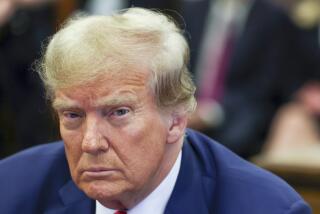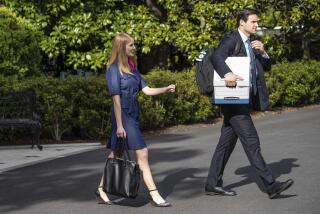Deaver Defense Rests Case Without Calling Witnesses
- Share via
WASHINGTON — Defense attorneys for former White House aide Michael K. Deaver stunned a federal court Monday by announcing that they will rest their case without calling any witnesses, thus setting the stage for Deaver’s perjury case to go to the jury late this week.
Herbert J. Miller Jr., Deaver’s chief defense lawyer, told the court that “based on the evidence we’ve seen and heard over the past six weeks, the defense has decided it has no need to put on any defense at all. Accordingly, we rest.”
A source close to the defense said that in addition to perceived weaknesses in the prosecution’s case, the decision was based on fears that Deaver, if he chose to take the witness stand in his own defense, might be shaken by the cross-examination of prosecutors and give answers that could damage his chances of acquittal.
‘Didn’t Merit a Response’
“The prosecution’s case didn’t merit a response,” Randall J. Turk, Miller’s associate, told reporters later. He said the defense will seek prompt action by U.S. District Judge Thomas Penfield Jackson in eliminating parts of the perjury indictment that were not sufficiently supported by testimony.
Jackson said he will hear the attorneys’ arguments today on the five-count indictment. After each side presents its final statements on the case to the jury, jurors will begin their deliberations either late Thursday or early Friday.
Deaver is accused of lying last year to a House subcommittee and a federal grand jury that were investigating possible conflicts of interest in his post-government lobbying activities. A number of the charges involve Deaver’s replies of “I don’t recall” to questions about contacts he allegedly made with specific government officials on behalf of his business clients.
By resting their case, defense attorneys discarded earlier plans to call physicians to testify that Deaver is a recovering alcoholic whose memory of key events may have been clouded by alcoholism.
Called Moody, Erratic
Nonetheless, Deaver’s attorneys still are expected to make these arguments to the jury in their final statement, based on the earlier testimony of two lobbying associates who said that Deaver’s behavior at times was moody and erratic.
Defense lawyers also have pointed out that Whitney North Seymour Jr., the court-appointed independent counsel, failed to call four current or former officials to support parts of his indictment that charged that Deaver had contacted them and then lied about it.
They are former Transportation Secretary Elizabeth Hanford Dole; Assistant Secretary of State Gaston Sigur; Craig Fuller, Vice President George Bush’s chief of staff; and Canadian Ambassador Allan E. Gotlieb.
Seymour has said he never called Dole as a witness because she “has amnesia on this particular subject,” and Gotlieb invoked diplomatic immunity in refusing to testify. Seymour has not explained why he did not call Sigur and Fuller.
Sought Information
However, several Administration officials whom Seymour has called as witnesses have testified that Deaver sought information from them related to his business but that he never asked them to take any action for his clients. They said they never considered the contacts to be improper.
Judge Jackson said earlier that he was “sufficiently troubled” by a lack of evidence supporting some parts of the indictment but had to give prosecutors “the benefit of the doubt” until the defense presented its evidence. The arguments before Jackson today are expected to focus on the adequacy of evidence supporting three of the five counts.
If convicted on all five counts, Deaver could face maximum punishment of 25 years in prison and $34,000 in fines.
While charged with perjury in connection with his lobbying activities, Deaver is not accused of conflict of interest. Testimony has shown that he did lobby a number of government officials shortly after leaving the White House in May, 1985, but he had not previously worked in the same office with most of them, so these may not have been covered by the conflict-of-interest rules.
More to Read
Sign up for Essential California
The most important California stories and recommendations in your inbox every morning.
You may occasionally receive promotional content from the Los Angeles Times.










